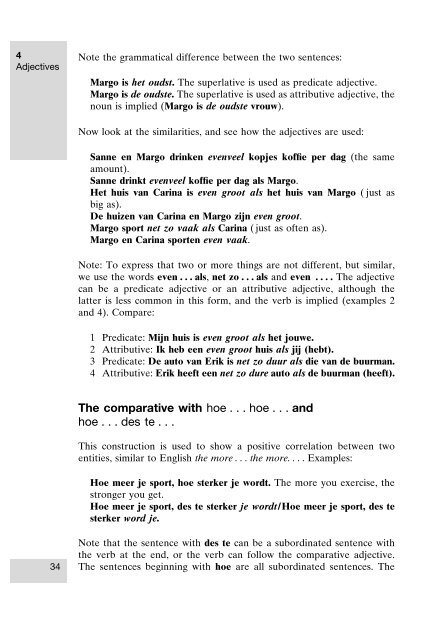er - Home
er - Home
er - Home
Create successful ePaper yourself
Turn your PDF publications into a flip-book with our unique Google optimized e-Paper software.
4<br />
Adjectives<br />
34<br />
Note the grammatical diff<strong>er</strong>ence between the two sentences:<br />
Margo is het oudst. The sup<strong>er</strong>lative is used as predicate adjective.<br />
Margo is de oudste. The sup<strong>er</strong>lative is used as attributive adjective, the<br />
noun is implied (Margo is de oudste vrouw).<br />
Now look at the similarities, and see how the adjectives are used:<br />
Sanne en Margo drinken evenveel kopjes koffie p<strong>er</strong> dag (the same<br />
amount).<br />
Sanne drinkt evenveel koffie p<strong>er</strong> dag als Margo.<br />
Het huis van Carina is even groot als het huis van Margo ( just as<br />
big as).<br />
De huizen van Carina en Margo zijn even groot.<br />
Margo sport net zo vaak als Carina ( just as often as).<br />
Margo en Carina sporten even vaak.<br />
Note: To express that two or more things are not diff<strong>er</strong>ent, but similar,<br />
we use the words even...als, net zo ...alsand even ....The adjective<br />
can be a predicate adjective or an attributive adjective, although the<br />
latt<strong>er</strong> is less common in this form, and the v<strong>er</strong>b is implied (examples 2<br />
and 4). Compare:<br />
1 Predicate: Mijn huis is even groot als het jouwe.<br />
2 Attributive: Ik heb een even groot huis als jij (hebt).<br />
3 Predicate: De auto van Erik is net zo duur als die van de buurman.<br />
4 Attributive: Erik heeft een net zo dure auto als de buurman (heeft).<br />
The comparative with hoe . . . hoe . . . and<br />
hoe . . . des te . . .<br />
This construction is used to show a positive correlation between two<br />
entities, similar to English the more ...the more. ...Examples:<br />
Hoe me<strong>er</strong> je sport, hoe st<strong>er</strong>k<strong>er</strong> je wordt. The more you ex<strong>er</strong>cise, the<br />
strong<strong>er</strong> you get.<br />
Hoe me<strong>er</strong> je sport, des te st<strong>er</strong>k<strong>er</strong> je wordt/Hoe me<strong>er</strong> je sport, des te<br />
st<strong>er</strong>k<strong>er</strong> word je.<br />
Note that the sentence with des te can be a subordinated sentence with<br />
the v<strong>er</strong>b at the end, or the v<strong>er</strong>b can follow the comparative adjective.<br />
The sentences beginning with hoe are all subordinated sentences. The


